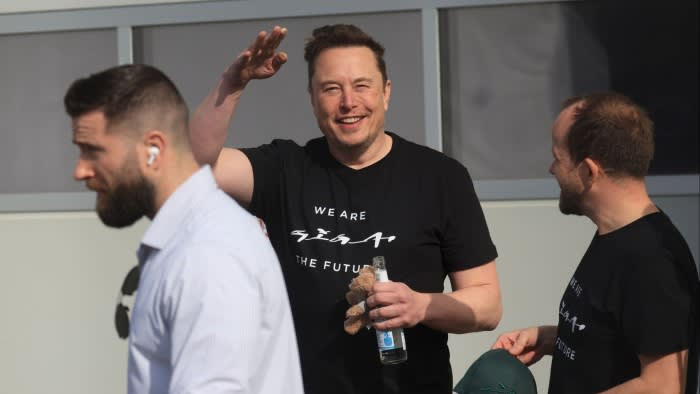
Unlock the Editor’s Digest for free
Roula Khalaf, Editor of the FT, selects her favourite stories in this weekly newsletter.
Brazil’s attorney-general has demanded “urgent regulation” of social media sites after Elon Musk threatened to disobey a court order banning certain profiles on his X platform and then called for a Supreme Court justice to “resign or be impeached”.
“It is urgent to regulate social networks,” said Jorge Messias.
“We cannot live in a society in which billionaires domiciled abroad have control of social networks and put themselves in a position to violate the rule of law, failing to comply with court orders and threatening our authorities.”
The comments came after X’s global government affairs team posted that it “has been forced by court decisions to block certain popular accounts in Brazil”.
“We do not know the reasons these blocking orders have been issued [and] We are prohibited from saying which court or judge issued the order, or on what grounds.”
The profiles are probably linked to far-right movements, which have found fertile ground on X and other social media platforms, including Telegram.
Musk suggested the court orders came from Alexandre De Moraes, a Supreme Court justice who has been a vocal advocate of cracking down on anti-democratic content online, particularly following riots on January 8 last year when thousands of far-right demonstrators stormed government buildings in Brasília.
Musk, the billionaire owner of X, vowed on Sunday to “publish everything demanded by [De Moraes] and how those requests violate Brazilian law”.
He called for Moraes to “resign or be impeached” and said the judge had “brazenly and repeatedly betrayed the constitution and people of Brazil”.
Musk, a self-declared free speech absolutist, bought X in late 2022 and quickly relaxed its moderation policies and reinstated several previously banned accounts. The moves have been welcomed by some on the right, but critics including civil rights groups have argued the platform is failing to adequately police hate speech and extremist content.
Musk’s latest comments echo talking points of Brazil’s far-right, which has long accused De Moraes and the Supreme Court of censorship and running a “judicial dictatorship”.
De Moraes is widely considered to have played a role in protecting Brazilian democracy during the 2022 presidential election, when the president at the time Jair Bolsonaro was spreading unsubstantiated claims about the integrity of the electoral system.
De Moraes also took a hard line in the aftermath of the Brasília riots, handing down lengthy sentences and accusing the demonstrators of trying to launch a coup.
Orlando Silva, a lawmaker aligned with the government, said Musk had disrespected the judiciary and that in response he would propose legislation setting out a “responsibilities regime for these digital platforms”.
“We have reached a limit. It is a response in defence of Brazil,” he said.
The extent of the threat to Brazilian democracy in 2022 was highlighted by a police investigation in February, which has alleged that Bolsonaro, in conjunction with several military officers, considered an armed intervention to prevent President Luiz Inácio Lula da Silva from taking office. Bolsonaro denies the claims.
As part of the alleged plot, Bolsonaro had De Moraes put under constant surveillance for weeks following the polls in October 2022, according to federal police.
Social media platforms have faced increasing pressure to comply with new laws in countries such as India and Turkey, which can require them to take down content or face bans, fines or the imprisonment of staffers.
Critics argue such rules are oppressive and can be abused by country leaders to silence dissidents and activists.
Despite regularly espousing free speech ideals, Musk has previously come under fire from critics for appeasing censorship demands from various governments. More recently, however, X has taken to posting publicly about the requests they receive.
In March, X said it had successfully challenged the Turkish government in court, after the country’s leaders had demanded the removal of nearly 50 posts critical of the government, including three from the opposition party leader.
X did not immediately respond to a request for further comment.




